
Holy Communion by Deborah Beach Giordano
Sacred Cannibalism?
In John's gospel text we are told that Jesus revealed himself as the Savior to the people in Capernaum — but he did so in a way that left most of them bothered and bewildered. The Lord called himself “the bread from heaven,” and insisted that, “Those who eat my flesh and drink my blood live in me, and I in them.”
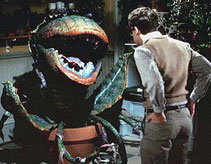 Taken literally that’s a scary statement. It sounds like cannibalism, pure and simple: eating the flesh and drinking the blood of a human being. With a core message like this one, it’s no wonder that the early Christians were held in disrepute by their fellow citizens.
Taken literally that’s a scary statement. It sounds like cannibalism, pure and simple: eating the flesh and drinking the blood of a human being. With a core message like this one, it’s no wonder that the early Christians were held in disrepute by their fellow citizens.
We, of course, understand perfectly what he was saying.
Jesus was talking about the Eucharist: he was describing the Lord’s Supper before it came into being. His words were a predictive secret — a foretelling of the Mystery Meal that his followers would celebrate as a sign of our faith in him.
He wasn’t talking about real flesh and real blood — that would be ... icky, to say the least — but about sacramental bread and wine. Jesus meant the nourishing food that is set upon the altar and transformed through the priestly words of Institution into “the body and blood of our Lord.” He didn’t say that we should eat real flesh and drink real blood and gnaw on real bones.
It’s all ok. Perfectly logical. We’ve explained it all away: there’s nothing scary or challenging about what Jesus was teaching.
But I wonder....
Shocking!
Those who were in Capernaum back in the day heard the Lord’s message before scholars and preachers had an opportunity to “interpret” what he was saying. They had no theological shock-absorbers to cushion the impact of his words. For them what Jesus said was, as some of his own disciples admit, “difficult”: hard to understand or imagine — never mind accepting it as gospel.
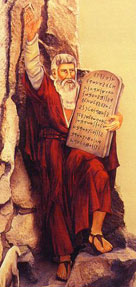 Our modern Western disgust at the idea of drinking blood is nothing when compared to the revulsion it inspired in the observant Jews who heard Jesus speak. To them his preaching was positively inflammatory. Not only did he claim a heavenly pedigree and downplay the miracle of the manna in the desert, he was apparently telling his followers to violate the Mosaic Law against the eating of blood.
Our modern Western disgust at the idea of drinking blood is nothing when compared to the revulsion it inspired in the observant Jews who heard Jesus speak. To them his preaching was positively inflammatory. Not only did he claim a heavenly pedigree and downplay the miracle of the manna in the desert, he was apparently telling his followers to violate the Mosaic Law against the eating of blood.
That was a grave error: a sin against the One True God; the sort of thing only the mad, the desperate, and demon-worshippers would do. Jesus’ words are so disturbing that many of those who hear him leave at this point; they go away and no longer follow the Lord’s teachings.
But it is a sure thing they always remembered what he said. As did those who remained. It was as if Jesus’ words were etched upon their hearts.
Back to the Future
Sadly, we’ve heard those same phrases so many times that we are lost to their power to shock, or amaze, or offend.
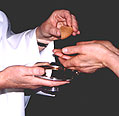 Christians have grown calmly confident over these many years, assured that we know what our Lord intended his followers to understand by this astonishing claim. We’re certain he meant “The Lord’s Supper,” and we’re sure he foresaw the wafers and wine that this meal would become. We’re comfortable in our belief that Jesus would look upon the ritual that has developed around this meal as sufficient evidence of our commitment to him.
Christians have grown calmly confident over these many years, assured that we know what our Lord intended his followers to understand by this astonishing claim. We’re certain he meant “The Lord’s Supper,” and we’re sure he foresaw the wafers and wine that this meal would become. We’re comfortable in our belief that Jesus would look upon the ritual that has developed around this meal as sufficient evidence of our commitment to him.
But I wonder....
Not by Bread Alone
In this same passage Jesus tells his disciples, “It is the spirit that gives life; not the flesh” (John 6:63) and we immediately recall his teaching as given in the gospels of Matthew and Luke:
‘One does not live by bread alone, but by every word that comes from the mouth of God.’
Matthew 4:4 (c.f., Luke 4:4)
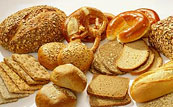 Bread is great, bread is important: it keeps us alive, nourishing our bodies and making us strong — but it isn’t all we need. It is not Ultimately Important. What truly matters, what gives eternal life, is not the food we take into our bodies — but what we feed our hearts and minds.
Bread is great, bread is important: it keeps us alive, nourishing our bodies and making us strong — but it isn’t all we need. It is not Ultimately Important. What truly matters, what gives eternal life, is not the food we take into our bodies — but what we feed our hearts and minds.
What matters is that we nourish our souls on the teachings of our Lord Christ: “The words I have spoken to you are spirit and life.” Jesus is the food that is important: the one who brings nourishment from heaven, the lifeblood of our souls.
A Lesson to Remember
Putting this teaching into “flesh and blood” terms was shocking. It got everyone’s attention — and no one ever forgot what the Lord said that day, even down to our present time.
Except....
Except when we forget what Jesus was talking about — and slip into a literal interpretation that ignores a far greater truth. When we substitute wafers and wine for the Bread of Life and the Living Vine, we are as far off the mark as the hearers who believed the Lord was encouraging cannibalism.
If we receive the Lord’s Supper as merely food, as some sort of weekly “Christians-only snack,” we’re missing out on what’s important. It isn’t important if the altar is laid with bread and wine or wafers and grape juice — or beer and pretzels, for that matter. What matters is that we nourish our souls on the life and teachings of Jesus Christ.
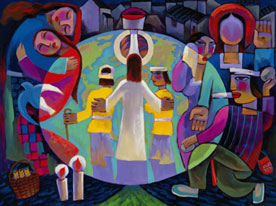
If we partake of this blessed meal with prayerful, attentive hearts it becomes a true sacrament: a connection between us and the Eternal One. Holy Communion is an outward sign of the inward grace of Christ’s redeeming presence in our lives, and of our commitment to follow him in all we say and do.
“Those who partake of this bread will live forever.”
Virtual hugs and real-time blessings,
Deborah +
Recommended Spiritual Exercise
Celebrate Holy Communion — with all your heart.